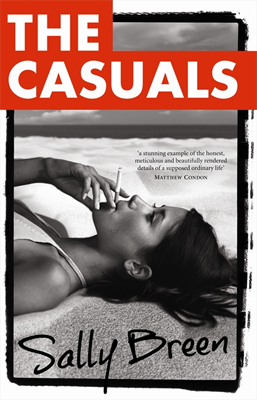The Casuals

The Casuals
'Three things happened at the dawn of the 1990s that would change everything about how we had lived before. We graduated high school, Microsoft shipped Windows 3.0 and America started the Gulf War. We became adults in the 1990s. The start of the world gone mega. Gone global. Gone mad. We became The Casuals and this is our story.'
The Casuals is the story of the life and times of one young woman's journey through the last two decades of the 20th century; from her pop-fuelled adolescence in the 1980s to a full-blown grunge ride in the 1990s, Sally Breen is the girl your mother warned you about. A charged and heady exploration of sex, drugs and pop culture, it is also a meditation on loss, death and grief as the author struggles to reconcile her place in a chaotic world. Sally Breen gives voice to her generation; those somehow smashed in between all the Xers and Ys - maybe lost, maybe beat, but most of all casual.
The Casuals
Harper Collins Australia
Author: Sally Breen
ISBN: 9780730493747
Price: $23.99
Interview with Sally Breen
Question: What inspired you to write The Casuals?
Sally Breen: It began as a collaborative project a number of years ago, a girlfriend and I were writing stories which were documenting the 1990's as a decade. We were very similar vintage and both thought it was a very interesting time, that hadn't been given enough room in the culture, people didn't remember how bright the 1990's were, culturally.
Charlotte, my friend, went off to work on other projects and I continued to write the book and I realised that in order to do the 90's you had to do the 80's and the book just spiraled out of that.
Question: Who did you write The Casuals for; those who can remember the 1990s or to educate those who can't?
Sally Breen: It is interesting looking at the reactions to the book. I think many people who are not so conservative can really relate to the book. I definitely think it is for a younger generation, probably my generation and younger. I am finding young people are really responding well to The Casuals even though they weren't necessarily kicking around in nightclubs, at that time, they seem to respond to the voice and the attitude. In terms of Australian literature there are different books that connect to the younger generation and hopefully The Casuals is one of those.
Sally Breen: It has been very interesting with the feedback I have been getting. I think you have to be fearless and I say that to my students, as a writing teacher. In a way your past is nothing to be ashamed of because your past has made you. There are a lot of people who are quite hesitant about The Casuals coming out and surprisingly some of the people who I thought would be kind of cool with it have changed a lot and seem to see that time as something to be ashamed of or something that they need to put behind them; I understand that they now may have corporate jobs or families and I understand the position. I think that you learn a lot and I don't necessarily see that time as a negative, I see that time as a huge positive.
Question: What research went into The Casuals? What did you do to help you recall the past?
Sally Breen: I did a number of different things, I spoke to a lot of people, I contacted old friends, I asked people to fill out surveys, which I drafted, about the 1990's - I asked things like 'What were you doing?' to 'What kinds of things were you saying?' and 'What language were you using?' I really wanted to get the language right. I also did a lot of research on the 1990's itself, I looked at the music and culture globally not just in Australia. I think pre-1995 the grunge scene was pretty huge all around the Western World. The Brits did it slightly different, but I think Australia really had a connection to the American grunge scene, so I really looked into all that and did a lot of research there.
Question: A lot has changed since the 1990s - what do you wish was still the same?
Sally Breen: Yes, it is interesting. I was in Brisbane for the Writers Festival and obviously a town like 'Brissy' has become a lot more sophisticated, but I think there is something lost in terms of the spirit of individualism that was around in those early days, where you'd walk through the Brisbane City Mall and there'd be Punks, Goths and all different sorts of sub-cultures kicking around, it was very vibrant and it felt very alive. Now, everybody looks the same. The indie culture is the closest that we get to individualism in the sense that they're against commercialism and corporatism. Generally there is not a lot of difference in the culture. I know that everyone individually is doing their own thing but I find that there is a perception to not really stand out, too much; I see that a lot teaching at University. There is a lot of pressure to have things, to look cool, to spend a lot of cash and there is absolutely no way we would have ever had a cocktail or worn $300 jeans - there is a real difference and I'm not sure how they cope with it, but they do seem to always be working, all the time! I do miss the sense of rebellion culture; I think we could really do with a bit more of that!
Interview by Brooke Hunter
MORE



